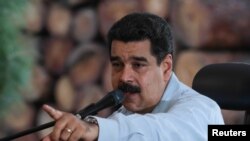A Non-Aligned Summit in Venezuela will offer solidarity to President Nicolas Maduro's socialist government, a draft of the final document shows, despite opponents' hopes the event would expose his international isolation.
Heads of state from the 120-nation Cold War-era bloc are invited to Venezuela's Margarita island over the weekend, though with only the leaders of Zimbabwe, Iran, Cuba, Bolivia and Ecuador currently thought to be coming, it could be a poor turnout.
Nevertheless, a version of the final document circulating among diplomats echoes Maduro's complaints that local opponents have been planning violence against him with U.S. connivance.
Critics say those are trumped-up accusations to justify repression and distract Venezuelans from blaming the ruling Socialist Party for the OPEC member nation's economic mess.
"The Heads of State or Government expressed deep concern at the violent actions that have taken place in Venezuela in the last weeks, aimed at destabilizing the democratically elected government," said a section in the communique, which ran more than 200 pages.
Venezuela's opposition has been stepping up street protests to demand a recall referendum against Maduro, whose security forces have been cracking down on activists and displaying weapons as proof of what they say are coup plans.
Praise for Chavez
The draft declaration hails Maduro's predecessor, Hugo Chavez, who died of cancer in 2013, as "a relentless humanist and champion of Latin American and Caribbean unity," and rejects Washington's "aggressive illegal policies" toward Venezuela.
Such language will irk Venezuela's opposition.
The coalition has urged summit delegates to look at the government's tough treatment of critics, including a string of recent jailings, and inability to prevent shortages, roaring inflation and lengthy lines at shops.
The Democratic Unity coalition has accused Maduro's government of flooding Margarita with extra food and supplies to cover up embarrassing national shortages and militarizing the island with 14,000 security personnel to squash dissent.
"The government wants to stop the people expressing themselves about the squandering of resources on the summit. They're terrified," said opposition leader Henrique Capriles.
Set up in 1961, the Non-Aligned Movement provided an alternative for nations that did not back either the United States or Soviet Union during the Cold War. But its relevance has declined since the 1989 fall of the Berlin Wall.
Other sections of the vast draft declaration urged U.N. reform and an end to the U.S. embargo on Cuba, and condemned Israel's treatment of Palestinians, Washington's policy on Syria and western sanctions on Zimbabwe.





